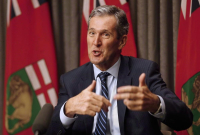Support strong Canadian climate journalism for 2025
Prime Minister Justin Trudeau has closed the door on decriminalizing illicit drugs to combat a national overdose crisis but British Columbia’s addictions minister says unprecedented deaths are a "wake−up call" to reconsider that stance.
Trudeau said decriminalization is not the approach Canada will take to deal with deadly overdoses often involving the opioid fentanyl.
"We are making headway on this and indeed the crisis continues and indeed spreads across the country but we are not looking at legalizing any other drugs than marijuana for the time being," Trudeau told a news conference Thursday at the end of a caucus meeting in Kelowna, B.C.
Hours earlier, the BC Coroners Service released statistics saying fentanyl has been detected in 81 per cent of illicit drug deaths in the province so far this year — an increase of 143 per cent over the same period in 2016.
In most cases, the synthetic opioid was combined with other drugs including cocaine, heroin and methamphetamine, the service said.
Trudeau said Canada is tackling the overdose issue through a broad range of actions including "border controls, the inspection of small packages, by working with our partners, whether it be the United States or China, by ensuring that all levels of government, provincial, municipal and federal are working together."
Judy Darcy, British Columbia’s minister of mental health and addictions, said criminalizing people for having limited amounts of drugs for their own use instead of providing treatment puts them at risk of fatally overdosing.
"I think we need to have this conversation in this country," she said of decriminalizing small amounts of drugs such as heroin. "Sometimes governments need to be pushed."
Darcy said decriminalization would go a long way in destigmatizing substance use because shame often bars people from getting treatment or even using supervised consumption sites where staff have access to overdose−reversing medication.
"If this overdose crisis is not a wake−up call, I don’t know what is," she said. "Not treating addiction the way we would any other chronic condition clearly is not working."
Darcy said federal government policies have allowed Vancouver to open North America’s only injectable heroin clinic for chronic substance users who have failed with other treatment options, and now decriminalization must be considered.
The BC Coroners Service said 876 people died in the province between January and July, up from 483 fatalities during the same months last year.
Darcy, who spoke about the epidemic Thursday at a drug−conference headlined by an addictions expert from Portugal, said that country’s experience of decriminalizing limited amounts of some drugs in 2001, along with providing more treatment and programs that address stigma, should serve as a lesson for Canada.
In July, then−health minister Jane Philpott and Justice Minister Jody Wilson−Raybould travelled to Portugal along with Canada’s chief public health officer Dr. Theresa Tam to learn more about that country’s approach to drugs.
Wilson−Raybould said then that taking a public−health approach to drug policy helps the justice system work better and her time in Portugal would provide valuable input as Canada reviewed its criminal justice system.
Conservative Member of Parliament Dianne Watts said she is working on a non−partisan private member’s bill that would call on all three levels of government to work together to deal with the opioid crisis.
Watts, who also attended the drug conference in New Westminster, B.C., said decriminalization works in Portugal because it’s part of a holistic approach that involves multiple government departments dealing with factors including detox, housing and treatment.
"I’m very supportive of that," she said. "Everybody’s family has been touched by some sort of addiction, whether it’s alcohol or drugs or whatever. This is a community issue and we need to get behind it."





Comments
how utterly predictable- political exigencies trump reason. Those exigencies?: persistence of a reflex to demonise drug use (alcohol excepted); unwillingness to lead in the sense of changing public attitudes; bureaucratic inertia, particularly on the legal and enforcement side. Has the government even considered the benefits of legalisation beyond health the health crisis? The reduction of enormous cost of enforcement and incarceration, the economic benefits of returning addicts to productive lives? The grotesque violence and social disorder in countries such as Mexico that are a direct consequence of the criminalisation of drugs? Are they aware of the strange politics that led to criminalisation in the early part of the 20th century?
It would be nice to hear what argument they have for NOT decriminalising. But you won't hear that. It would be far too silly.